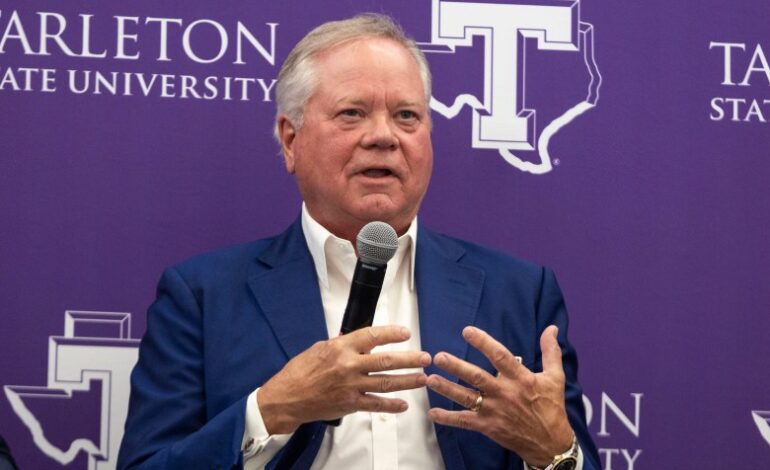Fort Worth Leaders Push for Major Growth in Higher Education Hub

URGENT UPDATE: Fort Worth, Texas, is positioning itself to become a major hub for higher education as local leaders convene to discuss ambitious growth plans. In a pivotal conversation on August 19, 2025, at Tarleton State Fort Worth, stakeholders, including John Goff, co-chair of the Fort Worth Now task force, highlighted the city’s unique opportunity to attract a Tier 1 research institution—a goal that could transform the local economy.
The task force was initiated by former Mayor Betsy Price to address challenges exacerbated by the pandemic. Goff emphasized the urgency of this initiative, stating, “Fort Worth is the largest city in the country without a Tier 1 research institution.” Five years later, the city is now among the fastest growing large cities in the nation, with higher education playing a vital role in this development.
Currently, Texas A&M School of Law is expanding, planning five new buildings, including a Law and Education Building slated to open in 2026. Meanwhile, Tarleton State University has recently opened its second building on its Fort Worth campus, while Texas Christian University aims to grow its student body by 5,000 as part of its ten-year strategic plan.
The University of Texas at Arlington is also making strides, breaking ground in April for UTA West, a new campus set to open in 2028. President Jennifer Cowley stated, “We’re thinking not just about what the needs are today, but what they need to be 30 years from now.” This expansion is crucial for attracting businesses and addressing the looming threat of an educational desert.
The partnership between UTA and aerospace giant Lockheed Martin, the county’s largest employer, is a significant aspect of this transformation. Kenneth Ross, Lockheed Martin’s director of communications, underscored the importance of education, stating, “Education is the lifeblood for everything we do.” The collaboration aims to create a robust talent pipeline that fills various needs within the company.
Highlighting the urgency for growth, Goff noted the recent relocation of the gaming company ProbablyMonsters to Fort Worth, spurred by the need for graduates in game design. “Fort Worth would have never attracted a game design company had it not been for this connection,” he explained.
However, challenges remain. Federal funding cuts for research and development pose a significant threat to long-term growth. Cowley remarked, “The federal budget is tight, and whether we invest in R&D has a direct impact on future innovations.”
Despite these hurdles, optimism prevails among educational leaders. Ahdieh anticipates that the negative impacts of reduced research funding will eventually reverse. He stated, “The economic benefits of this federal-higher ed partnership are so substantial that this has to be a pendulum.”
Additionally, Texas faces a brain drain as high-achieving graduates seek educational opportunities out of state. James Hurley, president of Tarleton State University, expressed concerns about nearby states targeting Texas’ top students. “They’re coming for our top 10% students,” he warned.
As Fort Worth continues its rapid growth—now officially the 11th-largest city in the U.S.—the collaboration between educational institutions and local businesses is more crucial than ever. Hurley concluded, “It takes all of us working in unison to ensure that our young people have opportunities right here, so they do not leave the state of Texas.”
Stay tuned for further developments as Fort Worth strives to become a beacon of higher education and economic growth.






